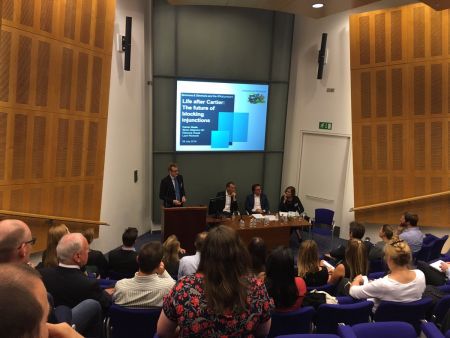Continuing professional development
New feature: The JC’s guide to how to present a law firm seminar
|
Office anthropology™
|
As box-ticking
The case, par excellence of the box-ticking culture than modern risk management has become.
Once upon a time, somewhere, someone in a self-regulating professional trade body for attorneys confected a worry that the daily practice of one’s professional calling might not be enough to keep that member’s edge suitably whetted. The suffocating drudgery that is your average attorney’s daily existence would, without intervention, render her stale, out-of-touch or dangerously unlearned in the ways of her calling.
A counter-intuitive thought, to be sure, but there you have it.
So was born “continuing professional development”: a stipulation whereby lawyers of any rank must periodically re-educate themselves. It has caught on: professional bodies in all walks of life now entreaty teachers, soldiers, healthcare professionals, accountants, architects and engineers all do similar exercises.
To be sure, keeping up with your CPDs is not that hard — a dozen or so hours, spread over a year, is all you need — though across the profession that is no small crimp on aggregate productivity.
Still, law firms beheld a great marketing opportunity: a jaunty breakfast seminar for their clients, followed by a chance to network over a dried-out bagel. Simmons & Simmons took it a step further, organizing a whole day of crushing tedium wherein their clients could see off half their yearly quota in one biscuit-saturated setting.
Look: free bacon sandwiches are great. That is all most jobbing solicitors need to show up. If the room is large and dark enough there is scope for a few winks. (Freshfields’ fabulously murky auditorium off Fleet Street offers primo snooze opportunities at the back). In brighter forums, it is a chance to catch up on Twitter, LinkedIn or follow the cricket.
But whether a CPD hour is well-spent—who can say? Is it vocational? Is it relevant? Is the content even accurate? Can one know whether, having signed in, young sir or ma’am spent any part of the next hour in the room, let alone conscious or paying attention? (The Americans had a crack at this by interposing a random number, to be read out at an unexpected moment, which candidates had to quote in their attestation to prove their attention. But even then only one brave attorney, for the greater good of the whole, needs so sit through the ordeal, and even she wouldn’t learn anything, her entire attention being devoted to listening out for the number.)
Now, let’s pretend for a moment you do show up, you do pay attention, and the talk is topical talk for your own area of practice.
Will it be the thing that staves off a claim sounding in professional negligence? No-one who has spent an hour before a wizened solicitor mumbling his way through a dense PowerPoint deck about the minutiae of transaction reporting under MiFID 2 would bet on it.
But hurry along — the bran muffins are going fast.
Dreary webinars in a time of cholera
Of course it’s bad enough having to kip through your bagel coma in the dusky recesses of Freshfields’ teatro; what proportion of a law firm’s webinar content is meaningfully conveyed when its audience — if an audience has dialled in at all (commercial lawyers as a class are among the worst public speakers known to humankind, so realists among their number must add this anxiety to all their other existential doubts) — is self-medicating in hastily converted box rooms, only half-listening to the dreary monotone through one earpiece while homeschooling the kids?
A small one, we humbly submit.
As punishment
The tide may be ebbing on the golden era of continuing professional education, but activist courts are always open to finding novel uses for it.
None more creative than that found by District Judge Linda Parker, who recently ordered Republican Party attorneys to undergo it as a sanction for “a historic and profound abuse of the judicial process” when dismissing their vexatious claims of electoral fraud during the 2020 presidential election.[1]
It is interesting to contemplate the theory of justice at work here. It can hardly be restorative or distributive, nor corrective — it axiomatic that one leaves a CPD session no wiser than when one entered it — so we conclude it was motivated by the desire to mete out punishment.
But twelve hours of it? And it might be more even than that: there were multiple charges; the sanction applies to each; the judgment does not state whether they are to be served concurrently or consecutively. Since one of the other sanctions is a reference to local professional regulators with a view to outright disbarment — following which, updated knowledge of procedural minutiae is utterly pointless, however thinly imparted —whatever your view of the constitutional impact of the plaintiffs’ behaviour, this is surely cruel and unusual punishment.
